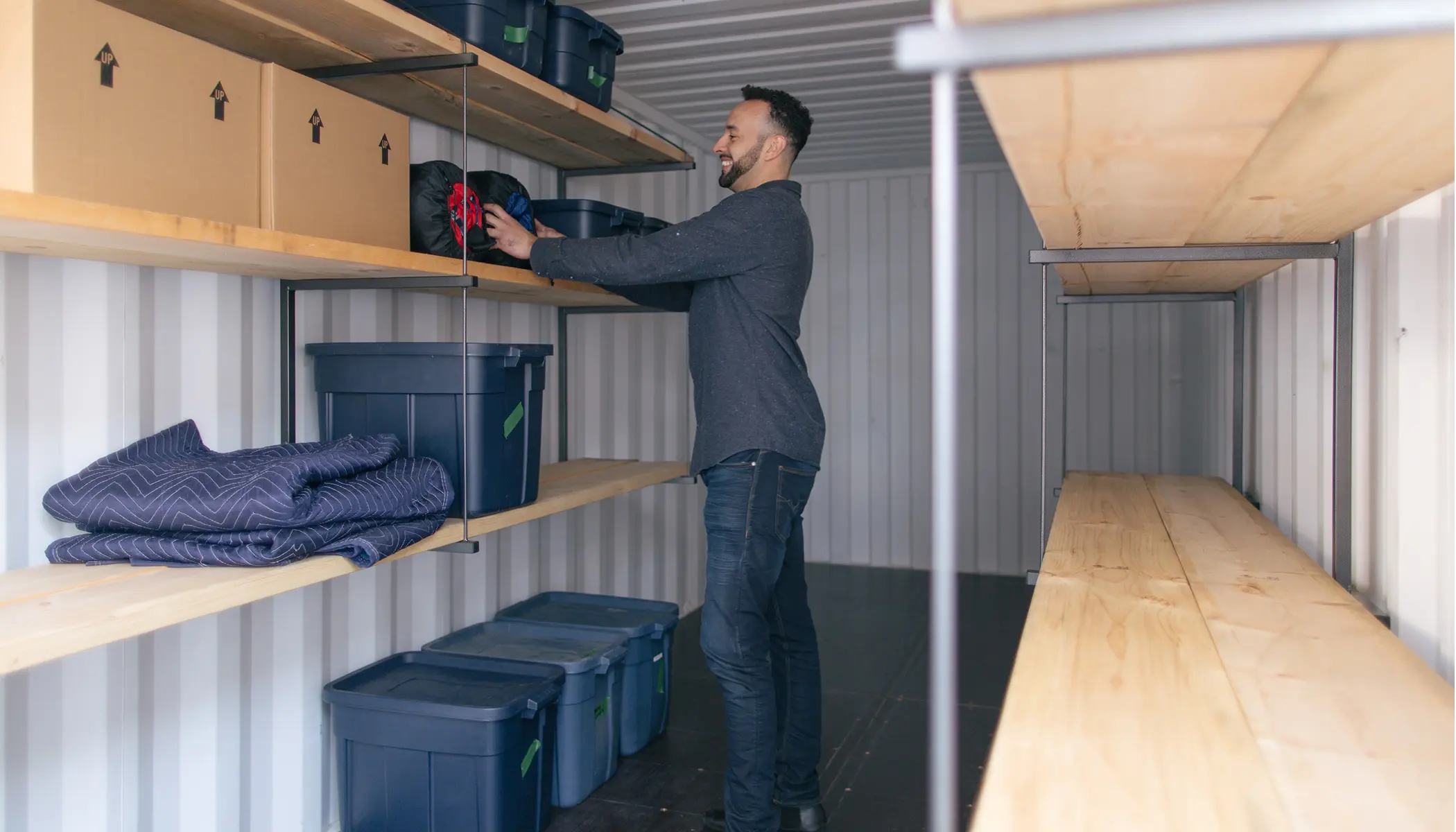
Man loading items into a portable storage container - BigSteelBox
How To Protect Your Valuables in Long-Term Container Storage
You might need long-term storage for a number of different reasons. Perhaps you’re downsizing your home or office and need somewhere to store your belongings while finding a more permanent place for them. Maybe you are in the process of moving and you need temporary storage in between homes. Or it could be you simply won’t be using your car or a piece of machinery for a while, and you want to keep it safely stored out of the way.
Storing belongings in your home or garage can quickly cause problems if space is limited. Warehouse storage is another option, but that can be expensive and it may be difficult to access your items when you need them.
Renting a portable storage container provides the solution to both issues: a secure and reliable storage option that frees up space in your home or garage, and your belongings remain accessible whenever you want to use them.
Is Long-Term Container Storage Right for You?
Before you commit to placing your belongings in long-term container storage, it’s worth taking time to consider your options and make sure it’s a good fit for you. Read on for some of the pros and cons of portable container storage.
Container Storage Pros:
Reliable and robust storage
You certainly want to store your items in confidence, knowing they’re well taken care of throughout the entire period of storage. Storage containers like BigSteelBoxes are perfect for this because they’re actually shipping containers. That means they’re robust, steel storage units that are designed to withstand extreme weather conditions and deter unauthorized access and theft, keeping contents safe.
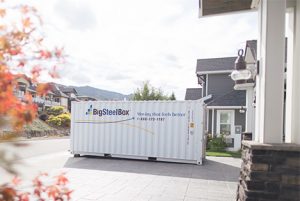
Easy accessibility for stored items
In many cases, you won’t just put your items into storage and forget about them. Even long-term storage container solutions can be accessed easily, especially when kept on your property.
Adding shelving can add an extra layer of Internal organization to make it easy to find the items you need, so everything is exactly where you expect it to be.
Portable storage is more flexible
Because a BigSteelBox storage container is a shipping container, it’s designed to be moved. So, if you only want it on your property for part of the year, you can easily have it transported and stored at your nearest BigSteelBox storage facility.
Container Storage Cons:
Specific considerations must be made for certain types of items
You won’t want to put certain items in just any old storage container. Items such as chemicals or sensitive electrical equipment need specific atmospheric conditions. So you’ll need to plan your requirements in advance. If this applies to your contents, you may want to consider purchasing a storage unit and adding modifications such as insulation, heating, cooling and additional vents to create a temperature-controlled environment suited for these types of items.
Many people simply won’t need a larger-scale, long-term storage solution
Long-term container storage is cost-effective, but only if you need it. If you’re just storing a few items for a short period of time, it probably won’t be worth the investment, and you’d be better off finding a smaller-scale storage solution.
Property restrictions
If you live in an apartment, condo or town home community, space is very limited and there may not be enough room for a container to be placed. In addition, many multi-family communities will not allow a container to be kept in a shared parking lot for an extended period of time. If this applies to you, and you will need frequent access to your stored items, then a self storage locker may be a better option for you.
You can also choose to bring your items to a BigSteelBox location to load a container there. If you store your items in a BigSteelBox and keep the container at the yard, you are still able to access it up to twice per month when you provide the store with at least 24 business hours notice.
Choosing the Right Container for Long-Term Storage
Modern container storage units are secure and versatile, with several container modifications available to you. This can give you peace of mind that your belongings remain safe and protected for longer.
Storage Container Sizes
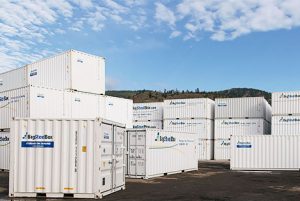 We rent and sell containers in the following sizing options:
We rent and sell containers in the following sizing options:
- 8 feet
- 10 feet
- 20 feet
- 40 feet
Whether you have a large or irregularly sized item that needs storing, or simply a lot of different items, storage space is an important consideration. For the best price on your container, get an accurate sizing estimate. You don’t want to be paying for space you don’t need.
In most cases, the contents of a moderately-furnished two to four-bedroom home will fit into one 20-foot BigSteelBox container.
Security
You want to protect your belongings, so security is an important consideration. BigSteelBoxes come equipped with a lock box that protects the padlock on the 16-gauge steel swing doors of our rental containers. This is a heavy-duty steel protective cover that prevents bolt cutters from accessing the padlock.
Durability
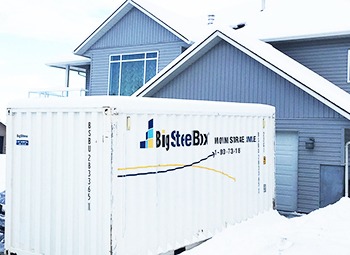 Shipping containers are highly durable and designed to protect cargo over arduous sea voyages. Our containers are built to stand up to the worst extremes of Canadian weather.
Shipping containers are highly durable and designed to protect cargo over arduous sea voyages. Our containers are built to stand up to the worst extremes of Canadian weather.
Convenience
Even long-term container storage solutions need a degree of accessibility — i.e., you need to be able to find items when you need them. Sturdy interior shelving can keep your items organized so that they can be easily found and accessed.
Protection Against Pests
Rubber gaskets fitted along both sides of the BigSteelBox door create a tight seal that prevents any unwanted guests like rats and mice from getting inside your storage container.
How to Pack and Organize Your Items for Long-Term Storage
Selecting the right container is a big step toward ensuring peace of mind, but the next steps are equally important. You need to make sure everything is properly packed and organized so you get it back just as you left it. How you do this depends on what kind of items you want to place in long-term storage.
Tips for Storing Computers and Electronics Long Term
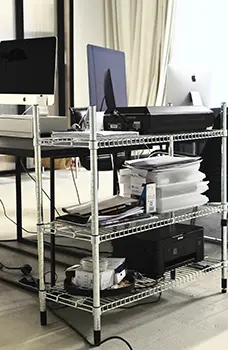 Choosing a secure and climate-controlled long-term storage solution is important here, but you need to go further than this. Packing and organizing are important as you consider how to store electronics long term.
Choosing a secure and climate-controlled long-term storage solution is important here, but you need to go further than this. Packing and organizing are important as you consider how to store electronics long term.
- Give electronics a clean to remove dust.
- Take all batteries out of your devices.
- Make sure all your data is properly backed up.
- Remove cables, then coil and store separately.
- Make sure everything is properly labeled so the right cable and battery can be returned to the right device.
- Use shelving solutions to keep electrical items off the ground.
- Separately pack fragile items and wrap them with protective foam or other soft storage solutions.
- Organize the space carefully and don’t overfill the container — this prevents items from ending up packed on top of one another.
- Consider using microfiber cloth inserts to protect screens, and anti-static bags to prevent damage from static electricity.
- Arrange for cleaning and inspection on a monthly basis.
Learn more about how to pack and move fragile items.
Preparing for Long-Term Document Storage
Documents might not always be considered fragile items, but they can still be susceptible to damage. If you’ll be storing important documents, take the following steps to protect your them when you put them in long-term container storage:
- Make sure your storage container is well-ventilated with low humidity.
- Choose a rodent-proof storage unit to prevent mice and rats from gaining entry — these pests can chew and damage documents.
- Use folders and boxes that are rated as acid-free to prevent corrosion of documents.
- Consider using plastic folders and inserts to add further protection for more valuable or business-critical documents.
- Consider implementing a handling policy — some documents may need to be handled with gloves, eliminating oil damage from direct manual handling.
- Label your documents carefully and create a storage manifest to make sure all documentation can be accessed when needed.
- Make sure all the information on your physical documents is backed up in secure digital storage, preferably multiple times, so no information is at risk of getting lost.
- Review all the document retention and handling requirements attached to each document in long-term storage — make sure you can remove and dispose of documents when the retention period is up.
Preparing Office Equipment for Storage
There will be quite a lot of overlap between office equipment storage and the long-term document and electrical storage already mentioned above. However, here are a few other considerations to make as you prepare:
- Make sure all ink cartridges are removed from printers and similar devices.
- Carefully itemize all devices and items for storage, and retain a detailed manifest so that everything ends up back in the right place.
- Ensure that work-sensitive items and documents are available and accessible if suddenly required.
- Consider notifying business partners or clients about the long-term storage arrangement.
- Consider providing access to other authorized personnel.
Storing Clothes Long Term
 Clothing is often kept in long-term container storage. This is fine, and your clothes should come out of storage in the same condition they went in, but only if you take a few important precautions.
Clothing is often kept in long-term container storage. This is fine, and your clothes should come out of storage in the same condition they went in, but only if you take a few important precautions.
- Give everything a clean and launder before storage so that dirt and grime don’t turn into a permanent stain.
- Dry all clothes thoroughly — never put damp or wet clothes into long-term container storage.
- Repair any damage you notice during cleaning, as this damage could worsen during storage.
- Use unscented cleaning products during preparation, as scented varieties may attract pests.
- Utilize vacuum storage bags to free up more space within the container, but don’t use ordinary plastic bags that could trap moisture.
- Consider using specialized acid-free storage solutions for your clothes.
- Make sure you have a full manifest of all the items you plan to store, and include information on their pre-storage condition.
Long-Term Vehicle and Machinery Storage
If you need long-term vehicle or machinery storage, containers can be a great option. They will help protect this expensive equipment from weather conditions and other potential hazards. But, of course, you need to prepare these larger items in the right way.
- Take the time to clean the vehicle or machinery.
- For storage periods longer than a month, consider an oil change.
- Use chocks as a safeguard against rolling — don’t engage parking brakes as this can cause significant wear on components.
- Make sure the machinery or vehicle in storage is fully insured.
- Ensure gas tanks are empty for any machinery that runs on gasoline.
Long-Term Container Storage — A Great Option for Protecting Your Belongings
The versatility of long-term container storage might surprise you. At the same time, you’re not losing access to these items over the period of storage, as you can open and enter the container whenever you need to. If you need to store bulky items or simply many different belongings, a long-term container storage unit could be perfect for you.
We’re here to make storage feel better for you! Call us on 1-800-373-1187 or get an instant price online.




